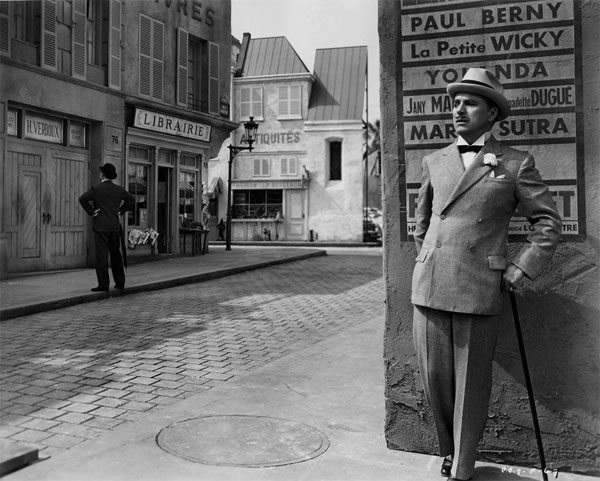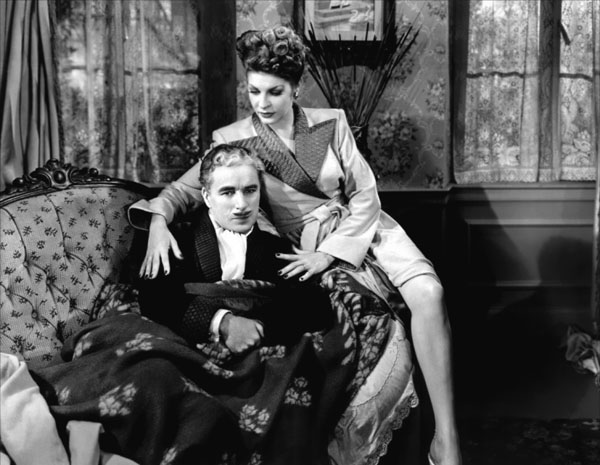“With his 1947 provocation Monsieur Verdoux, Charlie Chaplin completed a remarkable transformation from the universally beloved Little Tramp to a vilified monster both on-screen and off,” begins Dennis Lim in the Los Angeles Times. “In the most polarizing film of his career, just issued on DVD by the Criterion Collection, Chaplin plays the title character, a bank clerk who loses his job and finds a new business in murder—’liquidating members of the opposite sex,’ as he puts it. (johnnydelmonicos.com) ”
“Swindler, remorseless serial killer, bigamist, committed vegetarian, humanist, devoted husband, misogynist, egoist, cynic, amateur chemist, ersatz philosopher, rube—is there a more paradoxical (or fascinating) character in film history than Henri Verdoux?” asks Ignatiy Vishnevetsky, writing for Criterion. “The sharpest and funniest of Chaplin’s audacious late films, it is also the most complex: a comic attack on the middle-class values of success and respectability that crosses from gallows humor into moral inquiry, a film that exposes its protagonist even as it encourages its audience to laugh with him. This intricacy, however, doesn’t mean that Monsieur Verdoux is difficult to follow. It’s structured episodically and tells a straightforward story… Visual style is stripped down to elegant essentials; the camera’s pans and glides are unshowy yet perfectly timed, matching Chaplin’s movements beat for beat.”
Also at Criterion: “If, as in Jerry Lewis’s formulation, ‘comedy is a man in trouble,’ then it would seem to follow that the deeper the trouble, the richer the comedy.” Comedy writer Stephen Winer traces Chaplin’s evolution from slapstick to black comedy. Plus, a collection of posters for Chaplin’s films and a slide show annotated by Lisa Stein Haven: “Chaplin had a lifelong fascination with crime stories and prisons, dating all the way back to his childhood in turn-of-the-20th-century London, a city still reeling from the Jack the Ripper murders and where ‘penny dreadfuls’ (cheaply produced books containing suspenseful tales of murder and mayhem) were a readily available form of entertainment. And the character of Verdoux was inspired by the real-life murderer Henri Landru, whose story Chaplin had some connections to and may have been interested in for years.”
“Like The Great Dictator,” notes Noel Murray at the AV Club, “Monsieur Verdoux ends with a big speech from Chaplin expressing the theme of the film, as his character faces a judge and jury and compares his relatively minor crimes to the wave of war and genocide that swept across Europe in the ’30s and ’40s…. Many critics at the time read the speech and the sentiment as the most unconscionable kind of moral relativism, and Monsieur Verdoux faced resistance initially from newspaper columnists and local censors. It also prompted a stirring defense from James Agee, who used three consecutive weekly columns in The Nation to unpack Monsieur Verdoux, and to chide a culture that could drop atomic bombs but couldn’t trust sensible adults to watch a Charlie Chaplin comedy without turning into serial killers (or worse, Communists).”
“What constitutes morally acceptable behavior in a world where injustice is universal?” That, argues Calum Marsh in Slant, is the essential question the film poses. “The point of Verdoux’s conspicuously charming personality isn’t so much to make him appealing as it is to engage critically with that kind of appeal, to question the basis of an audience’s attraction to a character and, even more importantly, to suggest the degree to which that audience will embrace immorality. From scene to scene, Verdoux is depicted as little more than a loose web of sight gags and zany antics, of amusing pratfalls and one-liners delivered with poise; it’s no surprise that such clowning, as eminently performed, seems quite so compelling. But we’re acutely aware throughout that Verdoux is simply playing the part of the cartoon libertine, his on-screen inveigling tactics always foreplay before a fade to black signals death. Murder by ellipsis, with Verdoux duly exonerated.”
Criterion’s Blu-ray “is, predictably, the best home theater presentation of the film available,” writes Gary W. Tooze at DVD Beaver. At Ioncinema, Jordan M. Smith gives the release 4 out of 5 stars.
More? When Monsieur Verdoux was revived in 2008, I posted a roundup at GreenCine Daily.
For news and tips throughout the day every day, follow @KeyframeDaily on Twitter and/or the RSS feed. Get Keyframe Daily in your inbox by signing in at fandor.com/daily.





